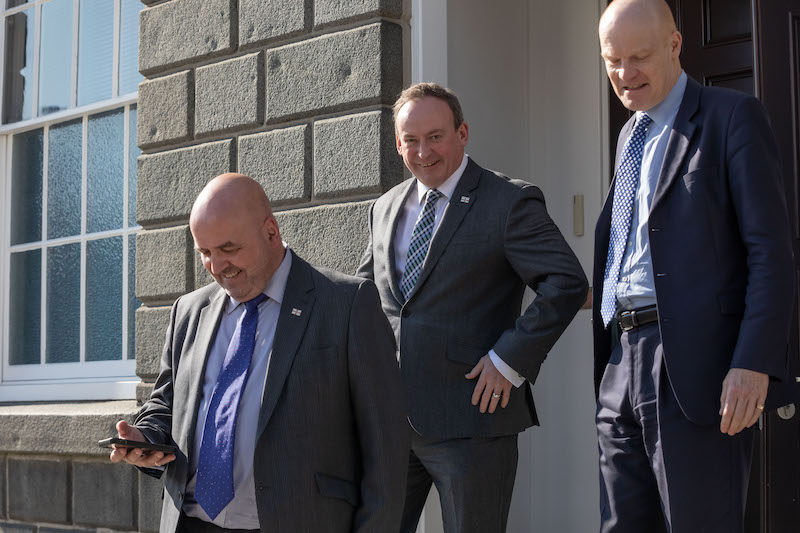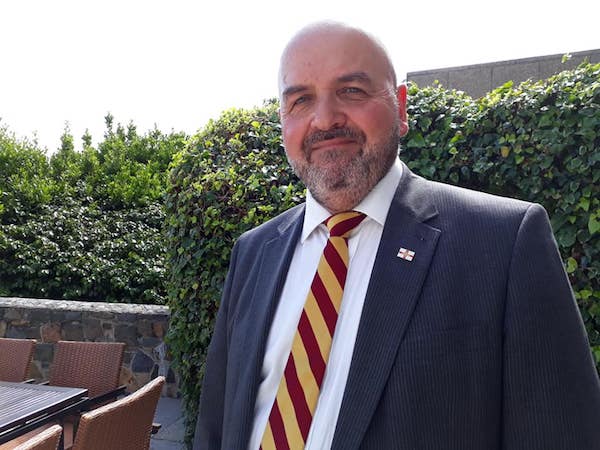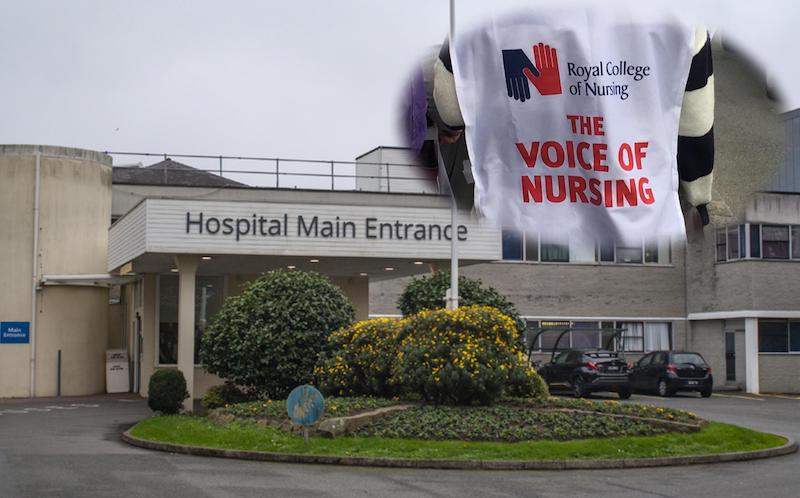

The pay offer on the table for nurses right now is 0.25% higher than they were originally asking for, according to the States, who have said they don't know how much more money they can offer without breaking the bank.
Deputy Jonathan Le Tocq has been trying to clarify what exactly is going on between one of the nursing unions battling for a pay rise and Policy & Resources, as misinformation has been leaking into the public domain.
This is all happening as the Royal College of Nursing reaches the point of no return, walking away from negotiations, and starting to ballot members again to deicide whether they will go on strike.
But, after backlash for urging nurses to reconsider their latest offer, Deputy Le Tocq wanted to reiterate what exactly it was P&R have offered: 5% back paid until January, and 5% back paid until September, which in total, amounts of 10.25%, a figure more than the 10% nurses were asking for when this dispute first kicked off.

Pictured: P&R have been negotiating with the nurses to try and reach a deal, but for the last six weeks, the process has been managed by the independent industrial disputes officer, as per Guernsey law.
"You have seen from the budget debate just how pressured we are from all sides, and bear in mind that a pay increase has implications not just for next year but for every year as well - some people don't seem to understand that - because it isn't just a matter of raiding a fund. You have to raid that fund every year from then on. We are dealing with something that has huge ramifications for the future," Deputy Le Tocq said.
"From my perspective I think its very unfair to say that we haven't engaged. Things like we weren't present at the last meeting - now I wasn't personally present at the last meeting but our representatives were, that's how these things work. Now if the IDO had called me, or Deputy St Pier and so on, one of us would have come. But he actually never got the two groups together. Our staff were sitting together on their own in a room for two hours. Now im sorry that the RCN didn't know that, but the fact is we were present, we were represented and we had staff there for two hours willing to continue to meet."
Pictured: the RCN has grown increasingly frustrated with what has been called a lack of movement from the States, but Deputy Le Tocq has said they have moved a great deal.
Concerns have been expressed from the States side that the RCN has not properly been communicating with its members, particularly as the other nursing unions have indicated support of the latest deal on the table. Deputy Le Tocq said there had been an innate frustration with the accusations that P&R did not care about or understand the pressures on nurses, particularly because right at the start of this process - when all public sector pay was being looked at - the Committee made an effort to promise nurses more than others because of their value.
Deputy Le Tocq explained: "I was very disappointed that the RCN didn't seem to communicate exactly what the offer meant in terms of their pocket. I think they got themselves into a roll of saying the only thing we can do is threaten industrial action, and they took their eyes off the real issue of us offering them coming out of January first with 10% higher. Now they will come out of September a few months ago with 10% higher, so we really have moved.
"I think the RCN don't understand that when they say they don't want to negotiate anymore, under the law it becomes a matter for the IDO under the law, a matter for him to decide how things are managed. We are forced to come together under the law, and there is a result in that, which is if it is not resolved it goes to a binding award from the tribunal, which means industrial action is meaningless in this process, because that is all you would get to anyway."

Pictured: Deputy Le Tocq passionately emphasised he did understand the problems facing nurses as his wife was a nurse.
At the heart of the debate over the nurse's pay, and also at the heart of what the nurses have been saying during their protests, has been a message that the 'system' needs fixing, and better pay will be a step toward that goal. One of the problems with the current system is the dependancy on agency nurses, who are paid better despite being part time staff.
Deputy Le Tocq said better pay packets would not make this issue go away, however, as was evidenced in Jersey, where there was also an agency dependancy.
"The idea that we can get rid of that dependancy just by increasing pay - it just isn't a solution, it isn't the only problem. We want to work on all of those issues, because the issue of equal pay is something we said right at the beginning of the year that we wanted to address, we are going to go ahead with that. Let's try and deal with this issue now so we have more time to get around the table and talk about equal pay and fair pay for all."

Pictured: The RCN is going to its members to ballot on whether it should strike in the next few weeks.
Finally, Deputy Le Tocq also outlined exactly what has happened over the last year in his interview with Express:
"At the start of this year we gathered representatives from all of the public sector unions - and there are over 20 different groups of employees in the public sector in Guernsey - and we said to them that the next few years would see us beginning a process of working toward rationalisation of all of the pay groups. Because at the moment we have all of these different pay groups all on different levels of pay and different sets of terms and conditions. I think we are the first committee to recognise that that is not a fair set up for a small community like Guernsey, and we are going to do something about it, but it is not going to happen in one year. We explained this to all of them at this meeting. First we had to do research to find out what the options were for getting to a position where we have fairer pay, if I can use that term, and we said that in order to do that, this year, as far as pay is concerned, we will be offering slightly below RPI for the majority of groups, except for those in agenda for change, of which the main group is obviously nurses.
"For nurses we would offer more. So right at the beginning of the year they all knew that.
"When the offer was at 5%, two of the unions accepted it, and that was before the Summer. P&R were ready and wiling to accept that, and they would have had a back pay increase. That would have been at the budgetary limit of what we could cope with.
"We have then since increased our offer. Firstly we got to a place where we felt we could no longer negotiate directly with them without the help of the Industrial Disputes Officer, now this is where the industrial disputes law is really important, and different to the UK. I'm not certain the RCN have grasped that, I think the other unions understand because they are more locally based, but the RCN don't seem to understand that the reason we have the IDL is because decades ago people realised it would be far more detrimental to have industrial action in Guernsey. So under our law, the IDO has six weeks to try and reach a settlement between the two different parties. After the six weeks, he is duty bound to refer it to a third party, normally a tribunal, which makes a binding award.
"We didn't want to have to go there, but we recognised that if we were going to get this done by the end of year, we needed to get help. So we are at that stage; we are nearing the end of those six weeks, during that process we have first of all increased our offer from 5% in January to 5% in January this year, which we would ensure was in people's pockets by the end of November this year. That wasn't acceptable, so we have increased it again, and brought the 5% to September this year, which will be back paid to September. That means they come out with actually above 10% that they asked for at the begining of this year. It will actually be 10.25%.
"At the stage we are at I cannot understand how anyone could say that is lack of engagement or lack of movement. We have done our best. P&R is certainly for nurses, and does not want to see nurses treated badly. We are unanimous in agreeing that nurses need special treatment.
"We recognise that the pressures on nurses and nursing staff are something that urgently need to be addressed, and I think we have demonstrated that in our willingness to move and take the hit to the budget. You have to remember we are talking millions and millions here, because there are thousands of people on that list."
Pictured top: Deputy Jonathan Le Tocq.
Comments
Comments on this story express the views of the commentator only, not Bailiwick Publishing. We are unable to guarantee the accuracy of any of those comments.